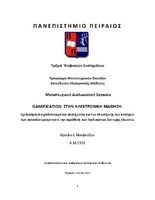Gamification στην ηλεκτρονική μάθηση: σχεδιασμός παιχνιδοποιημένου συστήματος για την υποστήριξη των κινήτρων των εκπαιδευομένων κατά την εκμάθηση των αγγλικών ως δεύτερης γλώσσας

Προβολή/
Λέξεις κλειδιά
Παιχνιδοποίηση ; Εκμάθηση αγγλικής γλώσσας ; MoodleΠερίληψη
Σχεδιασμός παιχνιδοποιημένου συστήματος για την υποστήριξη των κινήτρων των εκπαιδευομένων κατά την εκμάθηση των Αγγλικών ως δεύτερης γλώσσας
Στην παρούσα ερευνητική εργασία γίνεται προσπάθεια να διερευνηθεί σε ποιο βαθμό η πρακτική της Παιχνιδοποίησης (Gamification) επιδρά θετικά στην ανάπτυξη κινήτρων (motivation) των εκπαιδευόμενων. Στόχος της παρούσας εργασίας λοιπόν, είναι η σχεδίαση και υλοποίηση ενός ηλεκτρονικού εκπαιδευτικού σεναρίου ενσωματώνοντας δομικά στοιχεία, μηχανισμούς και στοιχεία δυναμικής παιχνιδιών βάσει των συνιστωσών του μοντέλου κινήτρων ARCS του Keller προκειμένου να ενισχυθούν τα εσωτερικά κίνητρα των εκπαιδευομένων. Το περιεχόμενο του εκπαιδευτικού ηλεκτρονικού σεναρίου αφορά την εκμάθηση Αγγλικών για ενήλικους εκπαιδευόμενους και υλοποιείται μέσω του συστήματος διαχείρισης μάθησης (LMS) Moodle.
Για τις ανάγκες της εργασίας, παραμετροποίηθηκε το ηλεκτρονικό εκπαιδευτικό περιβάλλον και σχεδιάστηκε το κατάλληλο εκπαιδευτικό υλικό ενσωματώνοντας στρατηγικές παρακίνησης όπως ορίζονται από τις συνιστώσες του θεωρητικού μοντέλου κινήτρων ARCS καθώς και δομικά στοιχεία, μηχανισμοί και στοιχεία δυναμικής παιχνιδιών για πέντε βασικές ενότητες του διδακτικού αντικειμένου.
Η έρευνα που διενεργήθηκε στα πλαίσια της παρούσας μελέτης, διερεύνησε την ύπαρξη στατιστικά μεγάλης επίδρασης του σχεδιασμού και της δόμησης του ηλεκτρονικού εκπαιδευτικού περιβάλλοντος και υλικού με την ενσωμάτωση της πρακτικής της Παιχνιδοποίησης στα κίνητρα των μαθητών (motivation), και ειδικότερα στις εξαρτημένες μεταβλητές Προσοχή, Σχετικότητα, Εμπιστοσύνη και Ικανοποίηση που αποτελούν τις συνιστώσες του μοντέλου κινήτρων ARCS του Keller.
Στην έρευνα επιλέχθηκε ένα σχέδιο με βάση την ποσοτική στατιστική ανάλυση των δεδομένων σε συσχετισμό με τις συνιστώσες της παρούσας εργασίας. Το δείγμα της έρευνας αποτέλεσαν 18 ενήλικες εκπαιδευόμενοι οι οποίοι αρχικά απάντησαν ένα ερωτηματολόγιο ανάλυσης αναγκών ώστε να διερευνηθεί η στάση τους απέναντι στα Αγγλικά και στα ηλεκτρονικά μαθήματα καθώς και προηγούμενες εμπειρίες τους. Στη συνέχεια ακολούθησε η πρώτη φάση της έρευνας που πραγματοποιήθηκε με τη χρήση του παραμετροποιημένου ερευνητικού εργαλείου IMMS (Instructional Materials Motivation Survey) του Keller (1993). To στατιστικό κριτήριο που χρησιμοποιήθηκε είναι το t-test μονού δείγματος (t-test one sample). Τα αποτελέσματα της έρευνας έδειξαν οτι ο σχεδιασμός του ηλεκτρονικού εκπαιδευτικού περιβάλλοντος και υλικού είχε στατιστικά σημαντική επίδραση στα κίνητρα των εκπαιδευομένων.
Επίσης, το ηλεκτρονικό μάθημα που ενσωματώνει δομικά στοιχεία, μηχανισμού και στοιχεία δυναμικής παιχνιδιών καθώς και στρατηγικές βάσει των συνιστωσών του μοντέλου κινήτρων ARCS αξιολογήθηκε από τους εκπαιδευόμενους διαδικτυακά μέσω του ερευνητικού ερωτηματολογίου COLLES που παρέχει η πλατφόρμα Moodle. Η μέτρηση της αποτελεσματικότητας που περιβάλλοντος έδειξε οτι οι εκπαιδευόμενοι έμειναν ικανοποιημένοι από το ηλεκτρονικό μάθημα που σχεδιάστηκε και υλοποιήθηκε στην πλατφόρμα Moodle.
Σε επόμενη φάση, το ηλεκτρονικό εκπαιδευτικό περιβάλλον και υλικό που σχεδιάστηκε για την ερευνητική εργασία δόθηκε προς αξιολόγηση αναφορικά με τις μεταβλητές Κίνητρα, Προσοχή, Σχετικότητα, Εμπιστοσύνη και Ικανοποίηση σε δυο ομάδες εκπαιδευτικών προκειμένου να διερευνηθεί αν πιστεύουν πως η ενσωμάτωση δομικών στοιχείων, μηχανισμών και στοιχείων δυναμικής παιχνιδιών σε ένα ηλεκτρονικό εκπαιδευτικό περιβάλλον ενισχύουν τα κίνητρα των εκπαιδευομένων. Αυτή η φάση της έρευνας πραγματοποιήθηκε με τη χρήση του παραμετροποιημένου ερευνητικού εργαλείου MTC (Keller, 2000b). Τα αποτελέσματα έδειξαν οτι οι εκπαιδευτικοί αξιολογούν θετικά την ενσωμάτωση δομικών στοιχείων, μηχανισμών και στοιχείων δυναμικής παιχνιδιών ως προς την ενίσχυση των κινήτρων των εκπαιδευομένων.
Η σημαντικότητα αυτής της εργασίας έγκειται στο γεγονός ότι παιχνιδοποιεί τη δομή και το περιεχόμενο του μαθήματος (Structural & Content Gamification), με στόχο την ενίσχυση των εσωτερικών κινήτρων των εκπαιδευομένων βάσει των συνιστωσών του μοντέλου κινήτρων ARCS του Keller. Δίνεται έμφαση συνεπώς, στο σχεδιασμό ενός ηλεκτρονικού εκπαιδευτικού περιβάλλοντος παιχνιδοποίησης συνδυάζοντας μαθησιακές στρατηγικές ανάπτυξης κινήτρων με την χρήση σύγχρονων τεχνολογιών τα οποία ενισχύουν τα κίνητρα των εκπαιδευομένων και οδηγούν στην επίτευξη των μαθησιακών στόχων.


